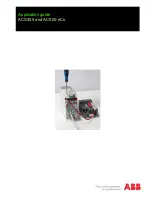
NX-200
43
Test Equipment Required for Alignment
Test Equipment
Major Specifi cations
1. Standard Signal Generator
(SSG)
Frequency Range
136 to 174MHz
Modulation
Frequency modulation and external modulation
Output
–127dBm/0.1µV to greater than –20dBm/22.4mV
When performing the Frequency adjustment, the following accuracy is necessary.
• 0.003ppm
Use a standard oscillator for adjustments, if necessary.
2. Power Meter
Input Impedance
50
Ω
Operation Frequency
136 to 174MHz
Measurement Capability
Vicinity of 10W
3. Deviation Meter
Frequency Range
136 to 174MHz
4. Digital Volt Meter (DVM)
Measuring Range
10mV to 10V DC
Input Impedance
High input impedance for minimum circuit loading
5. Oscilloscope
DC through 30MHz
6. High Sensitivity
Frequency
Counter
Frequency Range
10Hz to 1000MHz
Frequency Stability
0.2ppm or less
7. Ammeter
5A
8. AF Volt Meter (AF VTVM)
Frequency Range
50Hz to 10kHz
Voltage Range
1mV to 10V
9. Audio Generator (AG)
Frequency Range
50Hz to 5kHz or more
Output
0 to 1V
10. Distortion Meter
Capability
3% or less at 1kHz
Input Level
50mV to 10Vrms
11. 8
Ω
Dummy Load
Approx. 8
Ω
, 3W
12. Regulated Power Supply
5V to 10V, approx. 3A
Useful if ammeter equipped
ADJUSTMENT
■
Antenna connector adapter
The antenna connector of this transceiver uses an SMA
terminal.
Use an antenna connector adapter [SMA(f) – BNC(f) or
SMA(f) – N(f)] for adjustment. (The adapter is not provided
as an option, so buy a commercially-available one.)
■
Nut wrench
In order to turn the volume nut and the channel selector
nut, use a recommendation tool.
KENWOOD part No.: W05-1123-00
■
Battery jig (W05-1370-00)
Connect the power cable properly between the battery
jig installed in the transceiver and the power supply, and
be sure output voltage and the power supply polarity prior
to switching the power supply ON, otherwise over voltage
and reverse connection may damage the transceiver, or the
power supply or both.
+ Terminal (Red)
- Terminal (Black)
Note:
• When using the battery jig, you must measure the volt-
age at the terminals of the battery jig. Otherwise, a slight
voltage drop may occur within the power cable, between
the power supply and the battery jig, especially while the
transceiver transmits.
• The battery jig is detected as “Li-ion High Capacity Bat-
tery”.
Li-ion High Capacity Battery: R1=Open
Li-ion Normal Capacity Battery: R1=560k
Ω
S
–
+
C1
100P/25V
C2
470P/25V
C3
100μ/25V
R1
+
+Terminal
(Red)
–Terminal
(Black)
Power
supply
Power
cable
Schematic diagram
















































